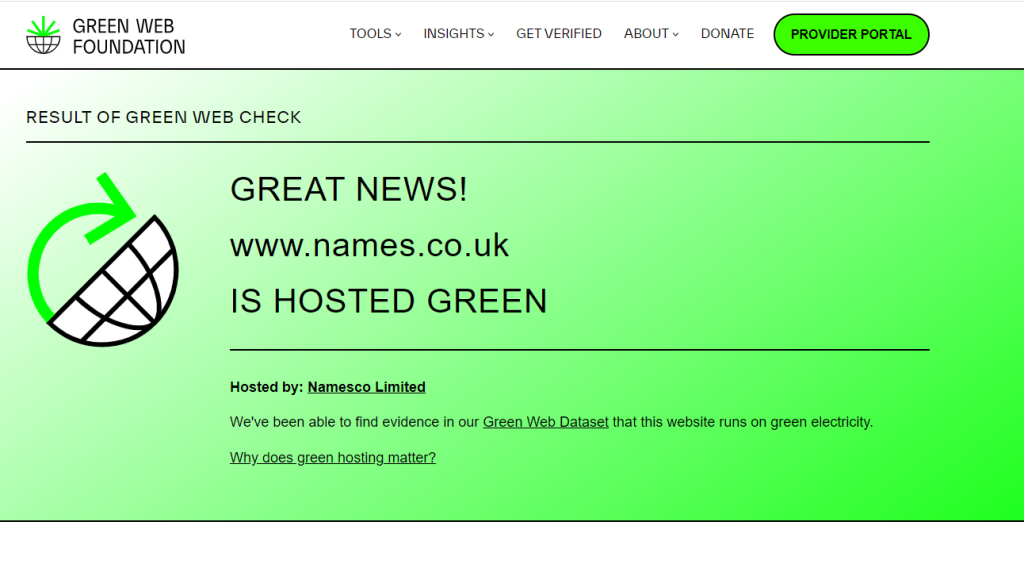Green web hosting benefits include reducing environmental impact and contributing to sustainability efforts. By using renewable energy sources and implementing energy-efficient technologies, green web hosting helps lower carbon emissions.
This environmentally friendly approach to web hosting promotes a healthier planet and aligns with eco-conscious values.
Choosing green web hosting can have a positive impact on both the environment and your business. With the growing concern for sustainability, more consumers are seeking eco-friendly businesses to support.
By utilizing green web hosting, businesses can showcase their commitment to environmental responsibility, thereby attracting environmentally-conscious customers and gaining a competitive edge in the market.
Furthermore, green web hosting providers often offer reliable and secure services, which can help businesses maintain their online presence while demonstrating their dedication to sustainability.
We will explore the various benefits of green web hosting and how it can contribute to a more sustainable and eco-friendly online ecosystem.
What Is Green Web Hosting
Green web hosting is a sustainable and eco-friendly approach to hosting websites that aims to minimize the environmental impact of running a website. This type of hosting utilizes renewable energy sources and innovative technologies to reduce the carbon footprint associated with data centers and servers. As businesses and individuals become more environmentally conscious, the demand for green web hosting continues to grow.
Renewable Energy Sources
Renewable energy sources, such as wind, solar, and hydroelectric power, are the foundation of green web hosting. By leveraging these clean energy sources, web hosting providers can significantly reduce their reliance on fossil fuels and non-renewable resources. This approach not only minimizes the environmental impact of hosting operations but also contributes to the overall sustainability and conservation of natural resources.
Reduced Carbon Footprint
Reduced carbon footprint is a key benefit of green web hosting. Data centers and servers are notorious for their high energy consumption and greenhouse gas emissions. However, through the use of renewable energy sources and energy-efficient technologies, green web hosting providers can significantly lower their carbon footprint, helping to mitigate the environmental impacts of hosting websites. This reduction in carbon emissions aligns with global efforts to combat climate change and pursue a greener, more sustainable future.
Benefits Of Green Web Hosting
The benefits of green web hosting go beyond just environmental stewardship. Choosing a green web host has several advantages for businesses and website owners alike. Let’s delve into the benefits of green web hosting.
Environmental Impact
Green web hosting minimizes the environmental impact of hosting by utilizing renewable energy sources. By opting for green web hosting, businesses contribute to reducing carbon emissions and promoting sustainability.
Energy Efficiency
Green hosting providers utilize energy-efficient technologies and practices to lower power consumption. This translates to reduced energy usage, helping to mitigate the environmental impact of hosting websites.
Positive Brand Image
Choosing a green web hosting provider allows businesses to showcase their commitment to sustainability, leading to a positive brand image. It demonstrates corporate responsibility and resonates with environmentally conscious consumers, potentially enhancing brand reputation.
How Green Web Hosting Works
The concept of green web hosting revolves around minimizing the environmental impact of websites and web servers. Green web hosting providers employ various strategies to achieve this, such as using renewable energy, implementing energy-efficient infrastructure, and participating in carbon offset programs.
Use Of Renewable Energy
To reduce their carbon footprint, green web hosting companies harness renewable energy sources, such as wind, solar, hydro, or geothermal power, to power their data centers and servers. By sourcing energy from these sustainable alternatives, web hosting providers can significantly reduce their reliance on fossil fuels and contribute to a cleaner and greener future for the planet.
Energy-efficient Infrastructure
Green web hosting providers prioritize energy efficiency in their infrastructure design. They utilize cutting-edge technologies and equipment that minimize energy consumption without compromising on performance. These systems are optimized to reduce power usage by efficiently managing server loads, cooling systems, and other energy-intensive components. As a result, web hosting companies can minimize their energy consumption and operational costs while still delivering reliable and efficient website hosting services.
Carbon Offset Programs
Caring for the environment goes beyond using renewable energy and energy-efficient infrastructure. Green web hosting providers often participate in carbon offset programs to neutralize any greenhouse gas emissions that cannot be eliminated entirely. Through these programs, web hosting companies invest in sustainable projects, such as reforestation or clean energy initiatives, to offset their remaining carbon emissions. By doing so, they contribute to the restoration and preservation of ecosystems while striving for a carbon-neutral web hosting industry.

Credit: twitter.com
Choosing A Green Web Hosting Provider
When it comes to launching a website, one of the most important decisions you’ll make is choosing a web hosting provider. Green web hosting providers have gained popularity in recent years as more businesses and individuals strive to minimize their environmental impact. By using renewable energy and implementing sustainable practices, these eco-friendly hosting companies help reduce carbon emissions and promote a greener future. In this article, we’ll explore the benefits of green web hosting and why choosing an environmentally responsible provider is a wise choice for your website.
Eco-friendly Certifications
One of the key factors to consider when choosing a green web hosting provider is their eco-friendly certifications. These certifications serve as proof that the company meets strict environmental standards and regulations. Look for certifications such as:
| Certification | Description |
|---|---|
| LEED | Leadership in Energy and Environmental Design (LEED) certification ensures that the data centers and infrastructure of the hosting provider meet high standards of energy efficiency and sustainability. |
| Green-e | Green-e certification guarantees that the hosting provider sources their electricity from renewable energy sources like wind, solar, or hydro power. |
| Carbon Offset | A hosting provider with carbon offset certification invests in environmental projects or purchases carbon credits to neutralize their carbon emissions from data centers and operations. |
By selecting a web host with these certifications, you can be confident that your website will be powered by clean energy, making a positive impact on the environment.
Transparency And Reporting
In addition to eco-friendly certifications, transparency and reporting are essential aspects to consider when choosing a green web hosting provider. It’s important to find a company that openly communicates their sustainability practices and provides regular reports on their environmental performance.
- Look for web hosts that publish annual sustainability reports outlining their energy consumption, carbon footprint, and efforts to reduce environmental impact.
- Transparency is crucial, as it demonstrates the hosting provider’s commitment to environmental responsibility and allows you to make an informed decision.
- You can also check if the provider has partnered with environmental organizations or participates in initiatives like the United Nations Global Compact for further assurance of their dedication to sustainability.
Reliability And Support
While the environmental impact is a significant factor, it’s equally important to consider the reliability and support offered by the green web hosting provider. After all, your website’s performance and uptime are crucial to your online success. When selecting a provider, pay attention to:
- The hosting provider’s track record and reputation for reliability. Look for customer testimonials and reviews to gauge their performance.
- Technical support and customer service quality. Ensure the provider offers responsive and knowledgeable support to address any issues promptly.
- The range of hosting plans and features available. Consider your website’s requirements and scalability, so you can choose a plan that suits your needs.
By opting for a green web hosting provider that excels in reliability and support, you can enjoy a website that is not only eco-friendly but also stable and well-maintained.
Tips For Making Your Website Greener
Optimizing your website to be more environmentally friendly not only helps reduce your carbon footprint but also improves its overall performance and efficiency. By implementing a few simple strategies, you can make your website greener without sacrificing functionality or user experience. Here are three key tips for making your website more sustainable:
Optimize Code And Images
One effective way to make your website greener is by optimizing your code and reducing the file size of your images. Bloated code and large image files can slow down your website and increase its energy consumption. To optimize your code, use minification techniques to remove unnecessary characters and spaces. This reduces the file size of your HTML, CSS, and JavaScript files, making them faster to load and decreasing server load. Additionally, compressing your images without compromising on quality can significantly reduce their file size. Use an image compression tool or plugin to find the right balance between file size and image quality.
Reduce Server Requests
Another way to make your website greener is to minimize the number of server requests it makes. Each time a visitor loads your website, their browser sends requests to the server to fetch various assets such as HTML, CSS, JavaScript, and images. The more requests your website makes, the more energy it consumes. To reduce server requests, combine multiple CSS and JavaScript files into a single file and compress them. This way, your website will make fewer requests and load faster, helping to decrease energy consumption.
Implement Caching
Caching is an effective technique that helps reduce the load on your server and improves the performance of your website. By storing static files, such as HTML pages, CSS, JavaScript, and images, in the visitor’s browser or a proxy server, caching allows your website to load more quickly and efficiently. When a visitor accesses your website, the cached files are retrieved, minimizing the need for server requests and reducing energy usage. Implementing caching can significantly enhance the sustainability of your website while providing a better user experience.
By following these tips and integrating them into your website development process, you can make your website greener and contribute to a more sustainable online ecosystem.

Credit: www.names.co.uk
Frequently Asked Questions On Green Web Hosting Benefits
Why Use Green Hosting?
Using green hosting is beneficial because it reduces the environmental impact of your website. It uses renewable energy sources, reducing carbon emissions. This helps protect the planet for future generations.
What Is Eco Friendly Web Hosting?
Eco-friendly web hosting utilizes sustainable energy sources to minimize environmental impact. It reduces carbon footprint and supports conservation efforts.
What Is A Green Website?
A green website is designed and managed with eco-friendly practices to minimize its environmental impact. This includes using renewable energy, energy-efficient hardware, and sustainable design. It aims to reduce carbon footprint and promote environmental conservation.
What Is The Purpose Of Web Hosting?
Web hosting enables storing and making websites accessible on the internet. It provides the necessary technologies and server space to host website files, allowing visitors to view and interact with the website at any time and from any location.
Conclusion
The benefits of green web hosting extend far beyond environmental impact. By choosing a sustainable hosting provider, you contribute to a cleaner and greener future for our planet. Not only does green web hosting help reduce carbon emissions, but it also enhances website performance and reliability.
With increasing awareness of environmental issues, adopting green web hosting practices is a responsible and wise choice for businesses and individuals alike. Let’s make a positive difference and embrace the power of eco-friendly technology.

